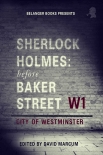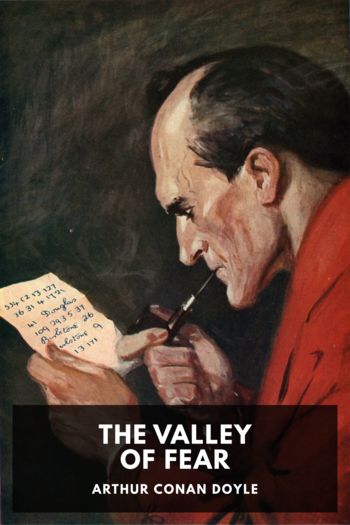Sherlock Holmes: Before Baker Street by David Marcum (books to read to be successful TXT) 📗

- Author: David Marcum
Book online «Sherlock Holmes: Before Baker Street by David Marcum (books to read to be successful TXT) 📗». Author David Marcum
“‘Anything else?’ he asked, smiling.
“‘You have boxed a good deal in your youth.’
“‘Right again. How did you know it? Is my nose knocked a little out of the straight?’
“‘No,’ said I. ‘It is your ears. They have the peculiar flattening and thickening which marks the boxing man.’
“‘Anything else?’
“‘You have done a good deal of digging by your callosities.’
“‘Made all my money at the gold fields.’
“‘You have been in New Zealand.’
“‘Right again.’
“‘You have visited Japan.’
“‘Quite true.’
“‘And you have been most intimately associated with someone whose initials were J. A., and whom you afterwards were eager to entirely forget.’
“Mr. Trevor stood slowly up, fixed his large blue eyes upon me with a strange wild stare, and then pitched forward, with his face among the nutshells which strewed the cloth, in a dead faint.
“You can imagine, Watson, how shocked both his son and I were. His attack did not last long, however, for when we undid his collar, and sprinkled the water from one of the finger-glasses over his face, he gave a gasp or two and sat up.
“‘Ah, boys,’ said he, forcing a smile, ‘I hope I haven’t frightened you. Strong as I look, there is a weak place in my heart, and it does not take much to knock me over. I don’t know how you manage this, Mr. Holmes, but it seems to me that all the detectives of fact and of fancy would be children in your hands. That’s your line of life, sir, and you may take the word of a man who has seen something of the world.’
“And that recommendation, with the exaggerated estimate of my ability with which he prefaced it, was, if you will believe me, Watson, the very first thing which ever made me feel that a profession might be made out of what had up to that time been the merest hobby. At the moment, however, I was too much concerned at the sudden illness of my host to think of anything else.
“‘I hope that I have said nothing to pain you?’ said I.
“‘Well, you certainly touched upon rather a tender point. Might I ask how you know, and how much you know?’ He spoke now in a half-jesting fashion, but a look of terror still lurked at the back of his eyes.
“‘It is simplicity itself,’ said I. ‘When you bared your arm to draw that fish into the boat I saw that J. A. had been tattooed in the bend of the elbow. The letters were still legible, but it was perfectly clear from their blurred appearance, and from the staining of the skin round them, that efforts had been made to obliterate them. It was obvious, then, that those initials had once been very familiar to you, and that you had afterwards wished to forget them.’
“‘What an eye you have!’ he cried, with a sigh of relief. ‘It is just as you say. But we won’t talk of it. Of all ghosts the ghosts of our old lovers are the worst. Come into the billiard-room and have a quiet cigar.’
“From that day, amid all his cordiality, there was always a touch of suspicion in Mr. Trevor’s manner towards me. Even his son remarked it. ‘You’ve given the governor such a turn,’ said he, ‘that he’ll never be sure again of what you know and what you don’t know.’ He did not mean to show it, I am sure, but it was so strongly in his mind that it peeped out at every action. At last I became so convinced that I was causing him uneasiness that I drew my visit to a close. On the very day, however, before I left, and incident occurred which proved in the sequel to be of importance.
“We were sitting out upon the lawn on garden chairs, the three of us, basking in the sun and admiring the view across the Broads, when a maid came out to say that there was a man at the door who wanted to see Mr. Trevor.
“‘What is his name?’ asked my host.
“‘He would not give any.’
“‘What does he want, then?’
“‘He says that you know him, and that he only wants a moment’s conversation.’
“‘Show him round here.’ An instant afterwards there appeared a little wizened fellow with a cringing manner and a shambling style of walking. He wore an open jacket, with a splotch of tar on the sleeve, a red-and-black check shirt, dungaree trousers, and heavy boots badly worn. His face was thin and brown and crafty, with a perpetual smile upon it, which showed an irregular line of yellow teeth, and his crinkled hands were half closed in a way that is distinctive of sailors. As he came slouching across the lawn I heard Mr. Trevor make a sort of hiccoughing noise in his throat, and jumping out of his chair, he ran into the house. He was back in a moment, and I smelt a strong reek of brandy as he passed me.
“‘Well, my man,’ said he. ‘What can I do for you?’
“The sailor stood looking at him with puckered eyes, and with the same loose-lipped smile upon his face.
“‘You don’t know me?’ he asked.
“‘Why, dear me, it is surely Hudson,’ said Mr. Trevor in a tone of surprise.
“‘Hudson it is, sir,’ said the seaman. ‘Why, it’s thirty year and more since I saw you last. Here you are in your house, and me still picking my salt meat out of the harness cask.’
“‘Tut, you will find that I have not forgotten old times,’ cried Mr. Trevor, and, walking towards the sailor, he said something in a low voice. ‘Go into the kitchen,’ he continued out loud, ‘and you will get food and drink. I have no doubt that I shall find you a situation.’





Comments (0)